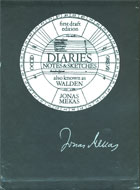
Walden: Diaries, Notes and Sketches by Jonas Mekas 2009
Distributed by Microcinema International/Microcinema DVD, 1636 Bush St., Suite #2, SF, CA 94109; 415-447-9750
Produced by Jonas Mekas
Directed by Jonas Mekas
DVD, color, 180 min.
Jr. High - Adult
Film Studies
Date Entered: 11/18/2009
Reviewed by Rob Sica, Eastern Kentucky UniversityThis rangy and feverish work by Lithuanian-born, American avant-garde luminary Jonas Mekas is several wonderful and rich things at once: a rigorously personal memoir, a marvelously revealing cultural artifact, and a frontier-extending work of artistic experimentation. Premiering in 1969, the film diary, modestly described by Mekas as “a series of personal notes on events, people (friends) and Nature (Seasons),” consists of chronologically strung together 16mm footage shot on his Bolex camera between 1965 and 1969 while immersed in the New York underground art scene. Diaries, Notes & Sketches divides all six reels of the footage between two DVDs, accompanied by a commemorative poster containing a guide of events and time table, and an exhaustive 150-page paperback book featuring sixty authors and minute-by-minute annotations from multiple sources.
Mekas, the principal founder of Anthology of Film Archives, one of the world’s largest archives of avant-garde cinema, packs the production, a celebratory memorializing of his personal reactions to his immediate surroundings, with a sprightly array of snippets featuring encounters with New York counter-cultural artists and icons such as Norman Mailer, Allen Ginsberg, Andy Warhol, Stan Brakhage, Timothy Leary, and Ken Jacobs; and events such as John Lennon and Yoko Ono’s 1969 Montreal bed-in for peace, and the Velvet Underground’s first public performance. Interwoven throughout are poetical spoken word musings by Mekas, recurring musical excerpts by Chopin, and ambient sounds of the various urban and rural environs he traversed.
As a complexly recursive exercise in fusing inwardly-directed self-expression and outwardly-directed exploration of the natural and social environments in which he was enveloped for a distinct stretch in time, the project’s connection to Henry David Thoreau’s Walden, however tenuous it may be, emerges gradually and perhaps not fully upon a single viewing, which makes the accompany book an invaluable resource, but which also testifies to a certain lack of ready accessibility to less patient and adventurous viewers. Recommended specifically for collections serving film studies.